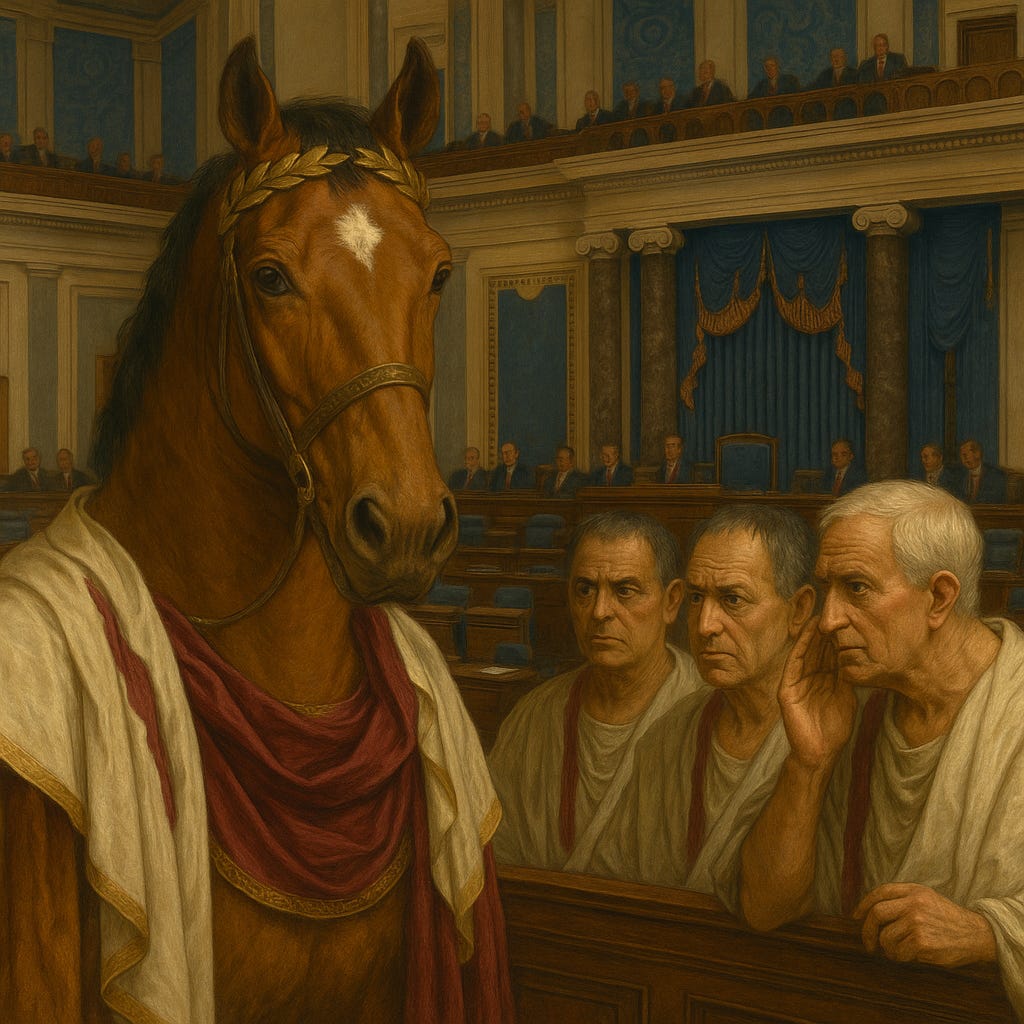Caligula’s Horse Gets a Cabinet Position
A Democracy on Its Last Legs, and the Hooves That Replace Them
The moment a horse took his seat in the Roman Senate, the Republic was already dead — the laughter was just the sound of the burial procession.
The Day the Stable Went to the Senate
History remembers Caligula for many things — cruelty, excess, the kind of self-regard that makes narcissism look like a part-time hobby. But his most enduring legend might be the day he elevated his horse, Incitatus, to the Senate.
Some say it was madness. Others say it was an insult to the senators themselves, a way of proving that a horse could do their jobs just as well. Either way, the message was clear: the dignity of governance was irrelevant. Only the emperor’s will mattered.
Picture the scene. The Senate chamber heavy with the smell of sweat and incense. Senators in pristine togas fanning themselves in the stifling air. The heavy bronze doors creak open, and in clip-clops Incitatus, wearing a crimson blanket stitched with gold thread. The chamber falls silent. Somewhere, a senator coughs. Somewhere else, another senator wonders if the horse will get more votes than he will next term.
Caligula smiles the way only a man who owns both the government and the narrative can smile.
And just for a second, you think you’ve seen this movie before.
The Official Story
To the public, the emperor’s men spin the appointment as a masterstroke of leadership. A rejection of “politics as usual.”
Why have an oily old man in the seat when you could have someone pure? Someone loyal? Someone who doesn’t have skeletons in his closet because his closet is a stable?
State messengers spread the word: Incitatus will bring dignity back to the Senate. He’s incorruptible. He’s never taken a bribe, never lied to the people, never filibustered a bill. Critics note that this is because he is, in fact, a horse. Supporters counter that this is exactly the point.
One column in the state gazette calls him “a breath of fresh air.” Another praises his “strong moral compass,” though it’s later clarified they were referring to the actual brass compass nailed to his stable wall.
The Joke Becomes the Norm
The tragedy is not that Caligula appointed a horse. The tragedy is that Rome got used to it.
At first there was outrage. Then came the jokes. Then came the shrug. Why shouldn’t a horse serve in the Senate if the senators already act like animals?
Within months, “Caligula’s horse” stopped being a scandal and started being a rallying cry for those who claimed the emperor was finally shaking things up. Soon, people began saying Incitatus was doing a better job than the rest of the chamber.
And maybe he was.
That’s how rot spreads. Not in one shocking moment, but in a slow drift toward absurdity until absurdity feels like normal life.
Today’s Incitatuses
We like to think this couldn’t happen now. That in a modern republic, competence would be a baseline requirement.
Except it has happened. Over and over.
We’ve seen cabinet positions filled by people whose only qualification was loyalty to the leader. We’ve seen top posts given to individuals who had never read the laws they were meant to enforce, never studied the fields they were meant to regulate, never believed in the institutions they were meant to protect.
We’ve seen education secretaries who disliked public education, environmental chiefs who thought pollution was just “nature’s spice,” and energy heads who couldn’t name the agencies they ran. We’ve had campaign donors awarded ambassadorships to countries they couldn’t find on a map. We’ve had advisors who treated the work like a reality show — because that’s what they thought governing was.
The horse may have been more qualified.
How the Horse Governs
Incitatus is no idle figurehead. He proposes bold reforms. He insists committee meetings start at dawn because “that’s when the oats arrive.” He votes “neigh” on everything except grain subsidies.
His infrastructure plan consists entirely of more stables. His education policy involves teaching every child the basics of hoof care. His foreign policy is limited to long, intense stares at foreign envoys until someone brings him a bucket of water.
And the public loves it.
How the Horse Wins Public Opinion
If you think this is about competence, you’ve missed the point.
It’s about loyalty. It’s about control. It’s about proving the leader can install anyone and the public will adapt. If they can get you to accept a horse in the Senate, they can get you to accept anything.
In the modern era, the horse’s popularity would be cultivated like a luxury brand. He’d be photographed visiting schools, nibbling apples from delighted children. He’d be filmed neighing at just the right moment in a press conference, as if delivering a perfectly timed comment on foreign policy.
Critics would point out that the horse does nothing. Defenders would reply, “Exactly. That’s why we like him.”
The Media’s Role in Grooming the Horse
A modern Incitatus wouldn’t just appear in the news. He’d trend.
Every awkward clip would become a meme. Talk shows would invite him to “speak” on air. One morning show would have a recurring segment called Coffee with Caligula’s Colt.
Political panels would seriously debate whether his silence showed “stoic leadership” or “troubling disengagement.” An op-ed would appear titled Why the Horse’s Leadership Style Could Save Democracy. By the second week, there would be T-shirts.
And while the spectacle dominates, the leader consolidates more power. Because while everyone’s watching the horse, no one’s watching the hands pulling the reins.
The Punchline You Don’t Want
Here’s the dark part.
If Incitatus ran today, he might win an election outright. Not as a joke candidate, but as a protest candidate against “the establishment.” Once in office, his mere existence would justify appointing others who are equally unfit, uninterested, or openly hostile to the work.
The horse’s victory becomes the precedent. The precedent becomes the policy. The policy becomes the new normal.
By the time you look up, the stable is full, the gates are shut, and the laughter has stopped.
Moral of the Mane
When Caligula elevated his horse, it was either a symptom of madness or a calculated insult to the Senate. The reason didn’t matter. The act hollowed the institution and proved the emperor’s will was the only real law.
That’s what happens when loyalty outweighs competence, when spectacle outweighs governance, when a seat of power is treated like a personal joke.
We laugh at the story of Incitatus, but every generation produces its own version. And each time, the people who could stop it tell themselves it’s not worth the fight.
Until one day, they’re being governed by the stable.
Final Summation
Absurdity in power is not harmless. It’s the proof of power’s reach. Once a leader can install a horse — or its human equivalent — without consequence, they no longer need your consent, only your distraction. And the day you accept the horse, you’ve already accepted the stable. And the stable never runs out of animals.
Further Reading:







Love your work, Dino. I don't know why you don't have many more followers.
We are there, and there's a stable full of horses!